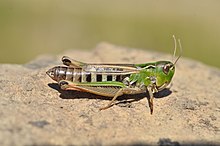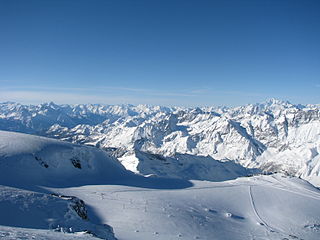
The Alpine region of Switzerland, conventionally referred to as the Swiss Alps, represents a major natural feature of the country and is, along with the Swiss Plateau and the Swiss portion of the Jura Mountains, one of its three main physiographic regions. The Swiss Alps extend over both the Western Alps and the Eastern Alps, encompassing an area sometimes called Central Alps. While the northern ranges from the Bernese Alps to the Appenzell Alps are entirely in Switzerland, the southern ranges from the Mont Blanc massif to the Bernina massif are shared with other countries such as France, Italy, Austria and Liechtenstein.

The black crappie is a freshwater fish found in North America, one of the two types of crappies. It is very similar to the white crappie in size, shape, and habits, except that it is darker, with a pattern of black spots. Alternate names for the species include calico bass, speck, speckled perch, speckled bass, moonfish, grass bass, strawberry bass, shiner, crawpie, oswego bass, sac-a-lait, and marigane noire.
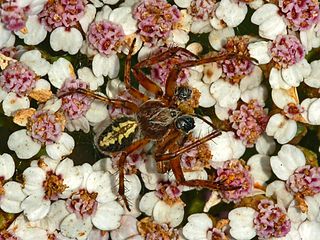
Aculepeira ceropegia, the oak spider, is an orb-weaving spider species belonging to the family Araneidae.

Pelophylax nigromaculatus, is a species of true frog found in East Asia, first described in 1861. This widespread and common frog has many common names, including dark-spotted frog, black-spotted pond frog, and black-spotted frog.

The Chinese red pika is a species of mammal in the family Ochotonidae. Typical of a pika it has short limbs, a small tail and round ears. Specific to the Chinese red pika has distinctive red color in its pelt. The Chinese pika typically lives in rocky terrain at altitudes between 600 and 1200 meters. and is endemic to the East Qinghai, West Gansu and Northern Sichuan provinces of China and Eastern Tibet.

The willowherb hawkmoth is a moth in the family Sphingidae. The species was first described by Peter Simon Pallas in 1772.
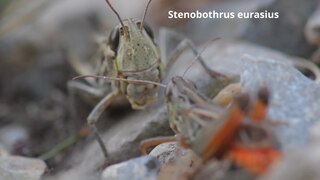
Stenobothrus eurasius is a species of insect in the family Acrididae. It is found in Hungary and Romania.

Stenobothrus is a genus of grasshoppers found in Asia, Europe, and North Africa.

Titanoeca quadriguttata is a species of spider in the family Titanoecidae. It is widespread in Europe, though absent from Great Britain, and is found in Austria, Belgium, Bulgaria, Corsica, Croatia, Czech Republic, France, Germany, Greece, Hungary, Italy, Liechtenstein, Moldova, Russia, Slovakia, Spain, Switzerland, the Netherlands, Ukraine.

Coenonympha arcania, the pearly heath, is a butterfly species belonging to the family Nymphalidae.

Synodontis nigromaculatus, known as the spotted squeaker, the blackspotted squeaker, or the speckled squeaker, is a species of upside-down catfish that is found widely in southern Africa. It has been identified in Angola, Botswana, the Democratic Republic of the Congo, Mozambique, Namibia, South Africa, Zambia, and Zimbabwe. It was first described by British-Belgian zoologist George Albert Boulenger in 1905, from specimens collected in Lake Bangweulu in Zambia.

Setina aurita is a moth of the family Erebidae. It was first described by Eugenius Johann Christoph Esper in 1787.
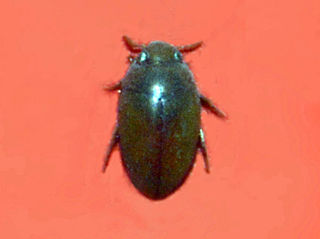
Noterus clavicornis is a species of beetle belonging to the family Noteridae.

Stenobothrus rubicundulus, the wing-buzzing grasshopper, is a species of short-horned grasshoppers in the family Acrididae.
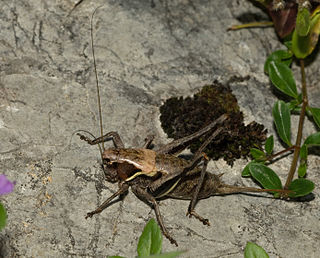
Pholidoptera aptera, the alpine dark bush-cricket, is a species of cricket belonging to the subfamily Tettigoniinae. It is found in Eastern and Central Europe in the Alps and the Alpine foothills. In Switzerland, their presence limited to the eastern Alps, the Southern Alps and the Schaffhauser Randen. In Germany it occurs south of the line Bodensee, to southern Munich. It also occurs in Austria and Slovenia. It is found at altitudes from 260 to 2360 meters above sea level in densely forested clearings or clearcuts, high-altitude orchards, bracken slopes, rocky, dwarf shrub communities and areas densely populated with grasses and herbaceous plants. At high altitudes, warm southern slopes are preferred.

Chorthippus vagans, which may be called the heath grasshopper or steppe grasshopper, is a species of grasshopper belonging to the subfamily Gomphocerinae. It is found across the Palearctic through Russia and Kazakhstan, east to Siberia, and north to Denmark. It is rare in the British Isles.

Chorthippus dorsatus is a species belonging to the family Acrididae, subfamily Gomphocerinae. It is found across the Palearctic. The species lives in Central Europe usually at altitudes 500–800 meters, in Switzerland it rises to 1800, in Bulgaria also over 2200 meters. Humid to moist meadows are preferred, especially around moors, but the species is also found on moderately dry meadows. Heavily agricultural or fertilized meadows are avoided.
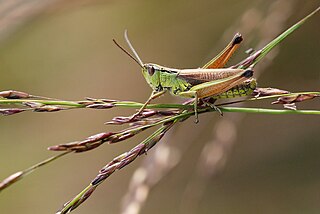
Pseudochorthippus montanus is a species belonging to the family Acrididae, tribe Gomphocerini. It is found across the Palearctic. In Europe, the northern distribution border passes through northern France, the Benelux countries and northern Scandinavia. The south boundary is the Pyrenees and French Central Massif, the south edge of the central Alps, the Apennines to in the northern part of the Balkan Peninsula and from Romania to Mongolia and Manchuria. The species is widespread in Central and Eastern Europe, even at low altitudes. It occurs in the Alps 370–2480 meters above sea level on. In Asia, the range extends to Siberia extends north to Verkhoyansk, the Altai and Kamchatka.

Stenobothrus stigmaticus is a species belonging to the family Acrididae subfamily Gomphocerinae and is sometimes called the lesser mottled grasshopper.
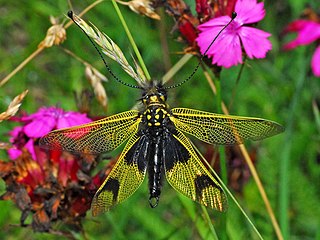
Libelloides longicornis, common name black yellow owlfly, is an owlfly species belonging to the family Ascalaphidae, subfamily Ascalaphinae.
